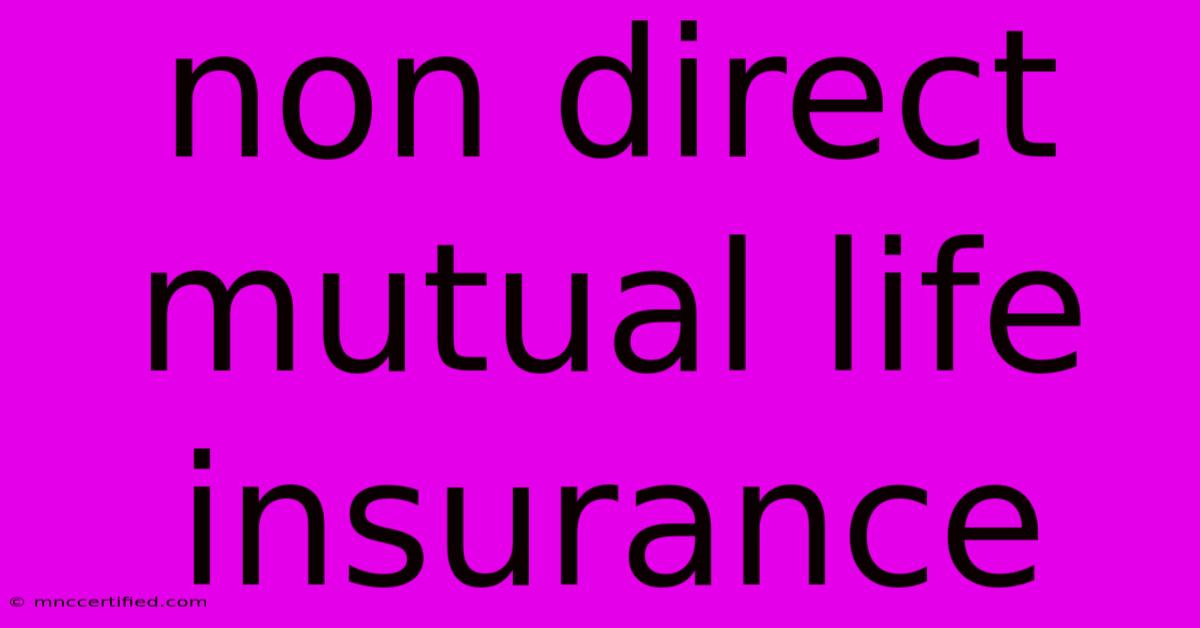Non Direct Mutual Life Insurance

Table of Contents
Demystifying Non-Direct Mutual Life Insurance: A Comprehensive Guide
Finding the right life insurance can feel overwhelming. With so many options, understanding the nuances of each type is crucial. This guide delves into the specifics of non-direct mutual life insurance, explaining its features, benefits, and how it differs from other life insurance models. We'll explore why it's a popular choice for some and help you determine if it's the right fit for your needs.
What is Non-Direct Mutual Life Insurance?
Unlike publicly traded companies, mutual life insurance companies are owned by their policyholders. This ownership structure often translates to lower costs and greater policyholder benefits. Non-direct mutual life insurance refers to policies offered by these mutual companies that are sold through independent agents or brokers rather than directly by the company itself. This distribution method offers broader reach and access to a wider range of insurance products.
Key Characteristics of Non-Direct Mutual Life Insurance:
- Policyholder Ownership: The company is owned by its policyholders, meaning profits are generally returned to them through dividends or lower premiums.
- Independent Agent Distribution: Policies are sold through independent agents, offering a wider selection of products and potentially more personalized service.
- Potential for Lower Premiums and Dividends: The mutual structure can lead to more competitive pricing and potential dividend payouts.
- Focus on Long-Term Value: Mutual companies often prioritize long-term stability and customer relationships over short-term profits.
How Does Non-Direct Mutual Life Insurance Compare to Other Types?
Let's contrast non-direct mutual life insurance with some other common types:
Non-Direct Mutual vs. Direct Mutual Life Insurance:
The primary difference lies in the distribution method. Direct mutual life insurance is sold directly by the company, often limiting the range of available products. Non-direct offers greater choice and access through independent agents.
Non-Direct Mutual vs. Stock Life Insurance Companies:
Stock companies are owned by shareholders, prioritizing profit maximization. Non-direct mutual companies, owned by policyholders, prioritize policyholder benefits. This can translate to lower premiums, potential dividends, and a stronger focus on customer service.
Advantages of Choosing Non-Direct Mutual Life Insurance:
- Potential for Lower Costs: The mutual structure often leads to more competitive premiums and the possibility of dividend payouts.
- Strong Financial Stability: Mutual companies generally exhibit strong financial stability due to their long-term focus and policyholder ownership.
- Personalized Service: Independent agents can offer personalized guidance and support throughout the policy selection and maintenance process.
- Wider Product Selection: Access to a broader range of products through independent agents caters to diverse needs.
Disadvantages to Consider:
- Less Control Over Product Selection: While offering variety, you may not have access to every product offered by the mutual company.
- Agent Commission: Independent agents earn commissions, potentially impacting the overall cost, though this is often offset by lower premiums and potential dividends.
- Finding the Right Agent: Requires research to identify a trustworthy and knowledgeable agent who understands your specific needs.
Finding the Right Non-Direct Mutual Life Insurance Policy:
Choosing the right policy requires careful consideration of your individual needs and financial situation. Key factors to consider include:
- Coverage Amount: Determine the appropriate amount of coverage to protect your loved ones.
- Policy Type: Explore different policy types such as term life, whole life, or universal life insurance.
- Premium Payments: Evaluate different payment options and their impact on your budget.
- Agent Selection: Thoroughly research and interview several independent agents before making a decision.
Conclusion:
Non-direct mutual life insurance offers a unique blend of potential cost savings, strong financial stability, and personalized service. However, it's crucial to carefully weigh the advantages and disadvantages, research different providers, and work with a reputable independent agent to determine if this type of insurance aligns with your individual needs and financial goals. Remember, seeking professional financial advice is always recommended before making significant insurance decisions.
Keywords: non-direct mutual life insurance, mutual life insurance, life insurance, life insurance companies, independent agents, insurance brokers, term life insurance, whole life insurance, universal life insurance, dividends, premiums, policyholders, stock life insurance, insurance comparison, financial stability, cost savings, personalized service.

Thank you for visiting our website wich cover about Non Direct Mutual Life Insurance. We hope the information provided has been useful to you. Feel free to contact us if you have any questions or need further assistance. See you next time and dont miss to bookmark.
Featured Posts
-
18 60 An Hour Is How Much A Year
Nov 21, 2024
-
Fidelity Bond Requirements Erisa
Nov 21, 2024
-
Castle Rock Insurance Pearisburg
Nov 21, 2024
-
Bond Cars The Definitive History
Nov 21, 2024
-
Burgharts Pmqs Win Attack On Labour Farm Tax
Nov 21, 2024